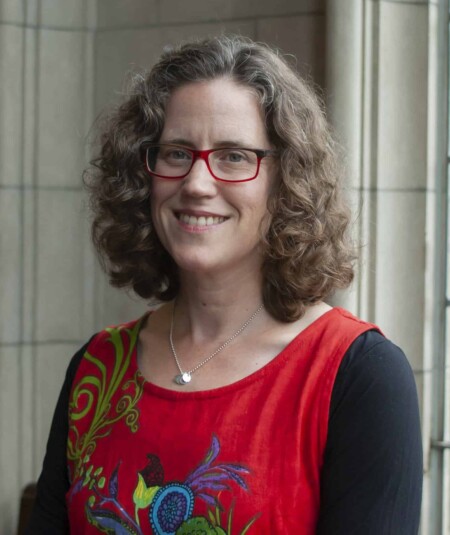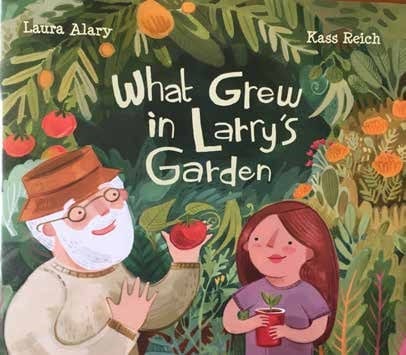Celebrating in a Pandemic
Laura Alary holds an MDiv (1996) and PhD (2004) from Knox College; she currently works on staff as a Library Assistant. This article first appeared in the Summer 2020 issue of Presbyterian Connection; reposted with permission.
Celebrating in a Pandemic
By Laura Alary

“Should I be celebrating?”
The question caught me off guard. “Is it tacky to self-promote right now?” Posted in a Facebook writers’ group, it made me instantly self-conscious. One of the casualties of this pandemic for me personally was the launch party for my latest picture book, What Grew in Larry’s Garden. While its cancellation was hardly earth-shattering, it was definitely a disappointment. Trying to make the best of things, I have been promoting the book in every way I can think of: grappling with technology to make a video; sharing reviews on Facebook; crafting a series of tweets connecting quotations from the story to our current situation (e.g., social distancing, supporting our neighbours). Until I saw the question it had not occurred to me that any of this was inappropriate.
Now I felt mortified. Had I been so steeped in my own particular blend of excitement and disappointment that I had been insensitive to the feelings of other people, especially those suffering from anxiety, anticipatory grief, worry over finances, exhaustion, or acute loneliness? Should I set my little book aside quietly until this crisis has passed?
The more I pondered these things, the more I began to hear my colleague’s query as part of a bigger question: Is it wrong to rejoice in the midst of chaos?
 Feeling muddled, I decided to return to What Grew in Larry’s Garden to see whether the story itself had light to shed on my dilemma.
Feeling muddled, I decided to return to What Grew in Larry’s Garden to see whether the story itself had light to shed on my dilemma.
We can figure this out
The intergenerational friendship at the heart of What Grew in Larry’s Garden involves a lot of trouble-shooting. When their garden is beset by bugs, slugs, snails and squirrels, Grace and Larry figure out solutions together (with some help from the public library). Larry is open to the contributions of a child. This attitude serves him well, for in the end it is Grace who finds a solution to the biggest problem of all.
Little green tendrils
What Larry only hints at in the beginning is that he and Grace are growing more than vegetables. While Grace puzzles over what this might mean, Larry brings hundreds of tomato seedlings to school and challenges his students to give them as gifts to people in their community—but not to friends and family. The students must look beyond what is familiar, pay attention to people they may have over-looked, and have the courage to reach out to strangers.
But a shadow fell
This whole community-building project is threatened by one person. The man who lives on the other side of Larry builds his fence so high it blocks out the sunlight on the garden. Although he claims the high fence makes him feel safe, his self-protection at the expense of others is an illusion that only destroys true community. Larry and Grace are frustrated, but instead of blaming or striking back in anger, they reach out in compassion, trying to understand the fear that motivates him.
Having good friends is the best way to feel safe
It is Grace who comes up with the fruitful alternative that eventually draws their reluctant neighbour out of the shadows of isolation into the warmth of shared feasting. She opens up a possibility beyond self-interest, and points to the truth that genuine and mutually supportive community is the best way to secure the safety and well-being of all.
Like it or not, we’re in this together Over the past weeks, our interconnectedness—for better or worse—has become undeniable. It feels like our global skin has been peeled back, revealing the fearful and wonderful intricacies of how things work beneath the surface, the complex and fragile tissue and vasculature of our social and economic systems. We have been forcibly confronted with a reality—we are all connected—that once seemed spiritually profound but now seems both perilous and infuriating. Never has it been more apparent to me that my fate is tangled up not only with those I love and those strangers for whom I feel a general benevolence, but also the reckless partygoers, the swaggering politicians, the toilet-paper hoarders and those who deride social distancing as a mark of weakness or lack of faith.
What Grew in Larry’s Garden points to some of the essential ingredients of a thriving community: co-operation, teamwork, patience, attentiveness, ingenuity, creativity, kindness and compassion. It reminds us that as this crisis continues to unfold we are going to need all the varied gifts that people (of all ages and abilities) can bring, including patience and wisdom in confronting ignorance and fear. It reminds us of the intricacy of our connections with one another. We truly are one body. What happens to one part is of vital concern to the whole.
So we return to the original questions: Should I be promoting my new book right now? Even when others are suffering? Is it wrong to rejoice in the midst of chaos?
Part of life in community is making space for people as they are and recognizing that even as we walk through similar terrains, we experience it differently. Our lives are never perfectly synchronized. Joy comes to one as sorrow visits another. Babies are born and people die. Books are writ-ten and contracts are cancelled. The holy challenge is to have hearts open wide enough to accommodate all. Rejoicing is a form of gratitude, and we can all share in appreciating and being thankful for the diverse gifts that enrich and sustain our communities in all times, especially difficult ones.
Someone once asked Martin Luther what he would do if he knew the world would end tomorrow. His answer? He would plant an apple tree. What kind of answer is that? Does it display insensitivity to the gravity of the situation? Or is it a statement of defiant hope?
Surely it is best (to borrow a phrase from William Blake) to kiss the joy as it flies, because it is beyond capturing, and you can never be certain when it will pass so close to you again.
So make art, if that is what you have to give. Sing a song. Paint a picture. Write a story. Weep with those who weep. Be glad—if you are able—with those who rejoice. Give what you can, or receive with thanks what others have to offer. Plant an apple tree.
Or maybe start by growing some tomatoes.
What Grew in Larry’s Garden is written by Laura Alary, illustrated by Kass Reich, and published by Kids Can Press. It is available online from amazon.ca or chapters.indigo.ca. Laura Alary is a religious educator and children’s book author, and a member of Guildwood Presbyterian Church in Toronto. Laura is a Knox College alumna (’96, ’04) and works as a Library Assistant at the college.
